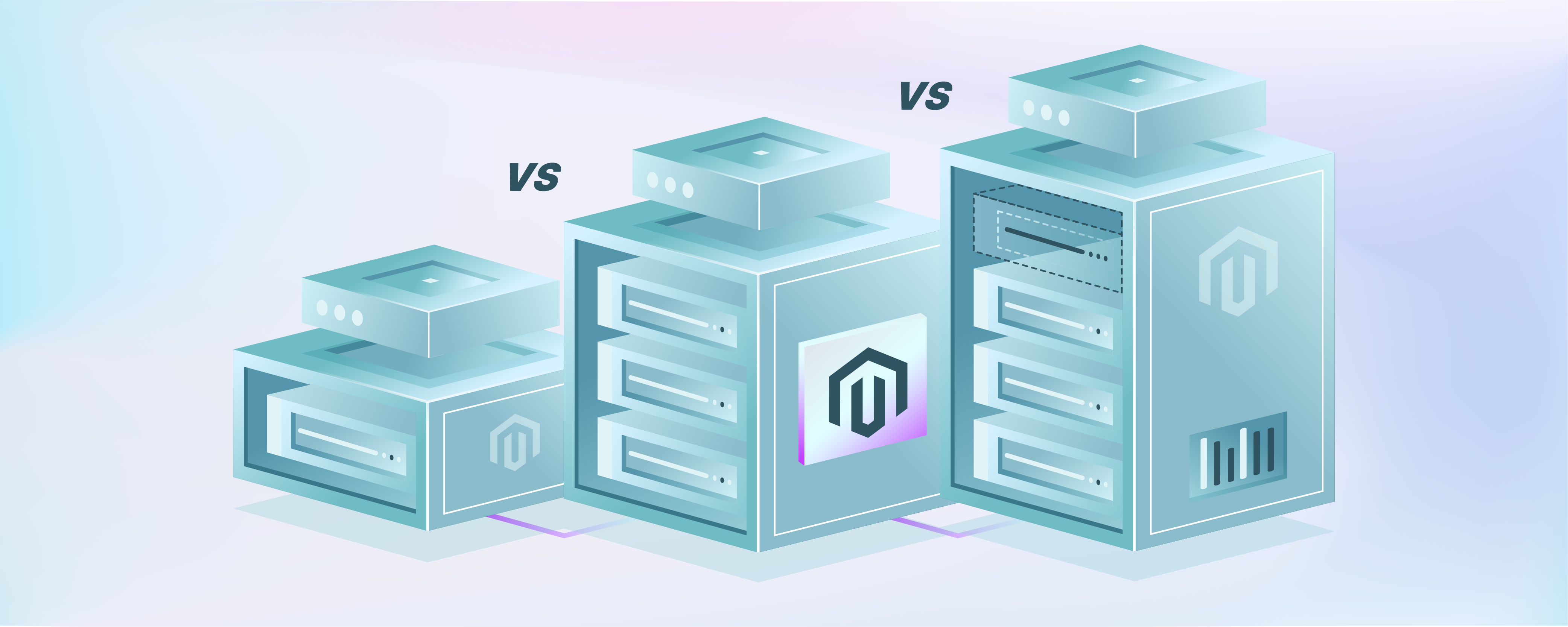
Magento Hosting Comparison: Single Server, Multi-Server vs. Auto-Scaling Plans
Magento is a robust and flexible eCommerce platform. It requires a hosting solution that can handle its complexity and resource-intensive nature to function optimally. This article will examine the differences between single-server, multi-server, and auto-scaling hosting plans. It will help you make an informed decision tailored to your business needs.
Key Takeaways
-
Reviews can help you select a reliable web hosting service, especially for Magento carts.
-
VPS hosting is a versatile option that balances cost and performance for Magento stores.
-
Support teams offer the necessary assistance and guidance needed in web hosting.
-
SSL certificates and firewalls are important for securing online transactions and protecting customer data.
-
Choosing a hosting location closer to your customer base can improve site speed and user experience.
Understanding Magento Hosting Architecture
Magento offers unparalleled flexibility and extensive features to address various reasons. It enables businesses to create customized shopping experiences. Understanding this platform’s complex nature and resource-intensive requirements can help you maintain optimal performance, security, and scalability.
In addition to providing the basic website hosting infrastructure, Magento hosting offers specific features tailored for online shops. It includes a variety of add-ons and tools that can enhance the functionality and performance of an eCommerce store.
I. Hosting Options
Magento can be hosted in several environments, each with advantages and challenges. The most common hosting options include:
1. Shared Hosting
Multiple websites reside on a single server, sharing resources. It is the most cost-effective option but offers the least performance and control.
2. Dedicated Hosting
A single website is hosted on its server, providing full control and better performance than shared hosting. It's more expensive and requires technical expertise.
3. Virtual Private Server (VPS) Hosting
A middle ground between shared and dedicated hosting. A server is divided into virtual machines that act as independent dedicated servers.
4. Cloud Hosting
Resources are spread across multiple servers in a cloud, offering scalability and reliability. Costs vary based on usage.
5. Managed Hosting
Regardless of the server type, managed hosting services manage maintenance, security, and performance optimizations. It allows businesses to focus on their operations.
II. Key Components of Magento Hosting Architecture
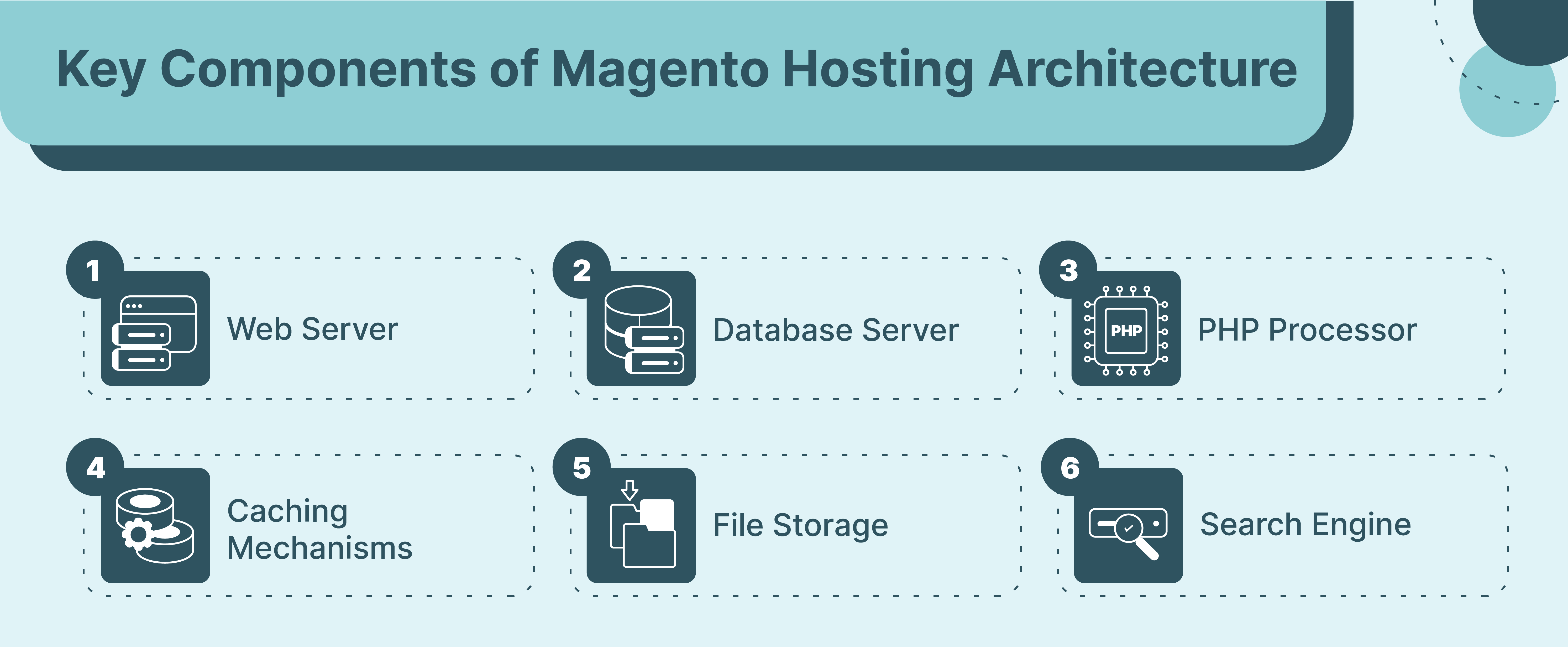
Understanding its key components is essential to ensure a Magento installation performs well.
1. Web Server
Apache or Nginx are popular choices for serving web pages. They handle requests from browsers and serve the Magento application to users.
2. Database Server
Magento uses MySQL or MariaDB as its database management system to store product data, customer information, and other content.
3. PHP Processor
Magento is built with PHP, requiring a processor like PHP-FPM to interpret the PHP code and generate web pages.
4. Caching Mechanisms
Technologies like Varnish, Redis, and Memcached are used to cache content. It reduces the load on the server and speeds up response times.
5. File Storage
Magento stores files (e.g., product images, JavaScript, and CSS files) that must be efficiently managed and served. Options include local storage or cloud-based services.
6. Search Engine
Elasticsearch or SOLR can be integrated into Magento for advanced search capabilities, improving customer experience.
III. Performance Optimization
1. Content Delivery Network (CDN)
Using a CDN to serve static content from locations closer to the user decreases load times.
2. Optimization of Scripts and Images
Minimize JavaScript and CSS files and compress images to speed up page loading.
3. Database Optimization
Regularly cleaning up the database to remove unnecessary data and ensure efficient operations.
IV. Security Considerations
Magento hosting requires the following security features:
1. Regular Updates
Keeping Magento, PHP, and other components up to date to patch security vulnerabilities.
2. Secure Communications
Implementing SSL/TLS certificates for encrypted connections.
3. Firewalls and Access Controls
Protecting the server and application from unauthorized access and attacks.
V. Scalability
The Magento hosting architecture can scale to accommodate increased traffic and transactions. It can involve scaling up server resources, adding more servers, or leveraging cloud hosting solutions for dynamic scaling.
Single Server Hosting for Magento
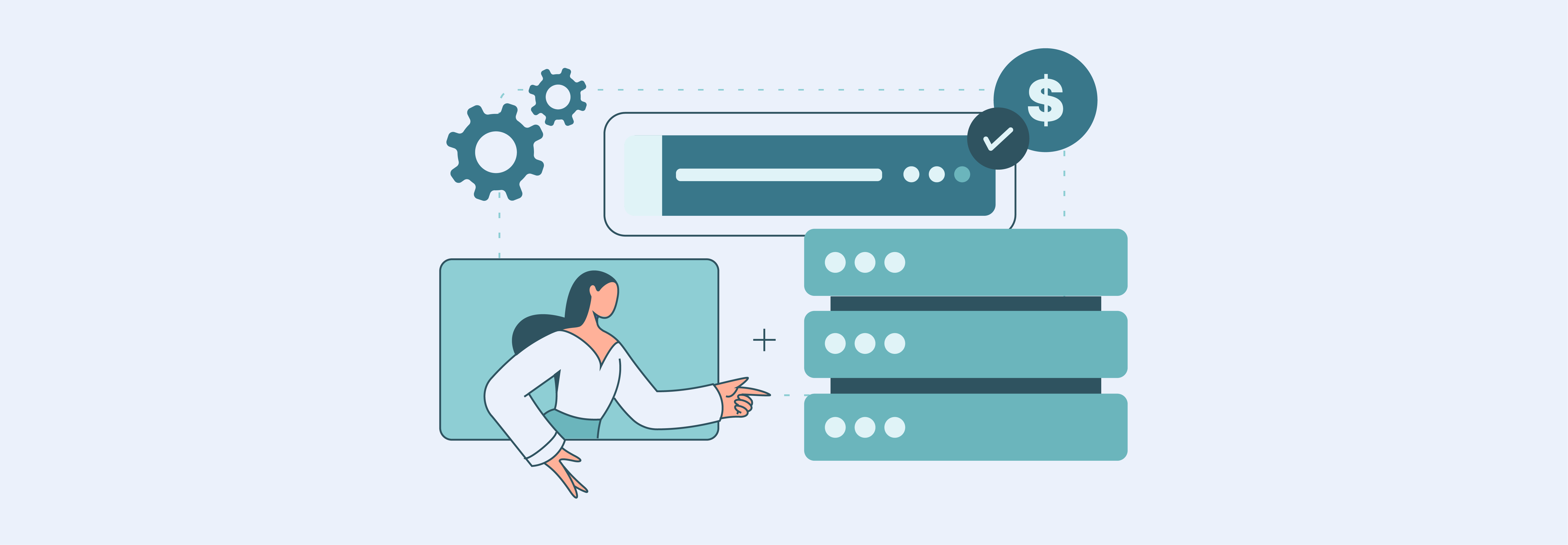
Single server hosting involves running all components of your Magento store (database, web server, and files) on a single machine. This straightforward and cost-effective setup makes it an attractive option for small to medium-sized businesses with moderate traffic levels.
Pros
1. Cost-Effectiveness
One of the most appealing aspects of single-server hosting is its affordability. Providers often offer competitive pricing plans, which attract startups and small businesses.
2. Simplified Management
For small Magento sites that do not require extensive customization or host many products, single-server hosting offers simplicity in management. With everything housed on one server, tasks such as backups, updates, and monitoring become more straightforward. This setup is particularly beneficial for businesses with limited IT resources.
3. Support and Uptime Guarantees
Reputable hosting providers offer robust customer support through live chat, email, and phone, ensuring help is readily available. Additionally, many single server plans come with uptime guarantees, ensuring the site remains accessible to visitors around the clock.
4. Easy Setup and Migration
Starting a Magento store on a single server is often hassle-free, with providers offering one-click installations and migration assistance. This ease of setup allows businesses to focus on designing their store and planning for growth rather than getting bogged down in technical details.
Cons
1. Scalability Limitations
As your Magento store grows in popularity and traffic, you may encounter scalability issues with single-server hosting. Increasing visitors, adding more products, and integrating extensions can strain server resources. It leads to slower page loads and potential downtime during peak periods.
2. Performance Challenges
Magento is known for its resource-intensive nature, requiring sufficient RAM, CPU, and bandwidth to ensure optimal performance. Single-server hosting sometimes fails to deliver the necessary resources, especially for sites with high traffic or extensive customizations.
3. Security Risks
While single-server hosting providers offer SSL certificates and perform regular backups, this hosting model can pose security risks. A compromised server could affect all aspects of your Magento store, from customer data to product information. To protect your site, you should assess the security measures in place, including firewalls, malware scanning, and data encryption.
4. Dependence on a Single Provider
Relying on one hosting provider for all your needs means that any issues with their service directly impact your Magento store. Downtime, software updates, or changes in pricing can all affect your site's availability and performance. Regularly reviewing your hosting provider's performance and exploring backup options is advisable to mitigate this risk.
Ideal Use-Cases
-
Small to medium-sized e-commerce sites with predictable traffic patterns.
-
Businesses on a tight budget looking for a straightforward hosting solution.
Key Features to Look For in Single-Server Magento Hosting
When exploring single-server Magento hosting options, it's essential to focus on key features that cater to the needs of your e-commerce store. Look for a hosting provider with a robust selection of Magento-optimized server configurations to ensure your shop runs smoothly.
In addition, security should be a top priority, with SSL certificates and malware scans to protect your customers' data. Scalability is another critical factor, allowing your hosting to grow with your business.
1. Server Specifications
-
Compute Power and Performance: Look for a server with sufficient power to handle Magento's resource-intensive nature. It includes a minimum of 2GB RAM and adequate CPU cores to ensure smooth operation. High-performance SSDs and the latest versions of PHP are also critical for faster processing and page load times.
-
Optimized Environment: The server should be configured specifically for Magento, supporting all its versions and offering features like caching. A Linux server is often recommended due to its stability and compatibility with Magento.
-
Control Panel: A user-friendly control panel is vital for efficiently managing your domain, databases, and other hosting features. This tool should allow business owners to perform essential tasks without needing deep technical knowledge.
2. Security Measures
-
SSL Certificate: An SSL certificate is non-negotiable for any e-commerce store. It encrypts data transferred between the user and the server.
-
Dedicated Security Measures: Beyond the SSL certificate, look for servers that offer advanced security protocols tailored to Magento's architecture. It could include firewalls, malware scanning, and intrusion detection systems.
-
Secure Data Center: The server's physical location in a secure, well-managed data center adds a layer of protection. It protects your server against physical threats and benefits from high uptime rates.
3. Backup Solutions
-
Automatic Backups: Regular, automatic backups are crucial for e-commerce stores to prevent data loss. Ensure the hosting plan includes comprehensive backup solutions covering files and databases.
-
Easy Restoration: Besides backing up your data, the hosting provider should offer an easy-to-use mechanism for restoring your site from a backup. This feature is invaluable in case of data corruption or loss.
-
Offsite Storage: For an added layer of security, look for backup solutions that store data offsite. It ensures your backups remain safe even if the primary server is compromised.
4. Additional Considerations
-
Pricing and Scalability: Evaluate the balance between the cost of web hosting plans and the features offered. Your chosen server should provide scalability options to accommodate your store's growth.
-
Support and Expertise: Access to knowledgeable technicians and support staff who understand Magento can significantly impact your store's success. Look for providers that offer 24/7 support through various channels, including tickets, live chat, and phone.
-
E-commerce Features: Additional features like one-click installers for Magento, support for multiple domains, and e-commerce-specific add-ons can enhance your store's functionality and user experience.
Multi-Server Hosting for Magento
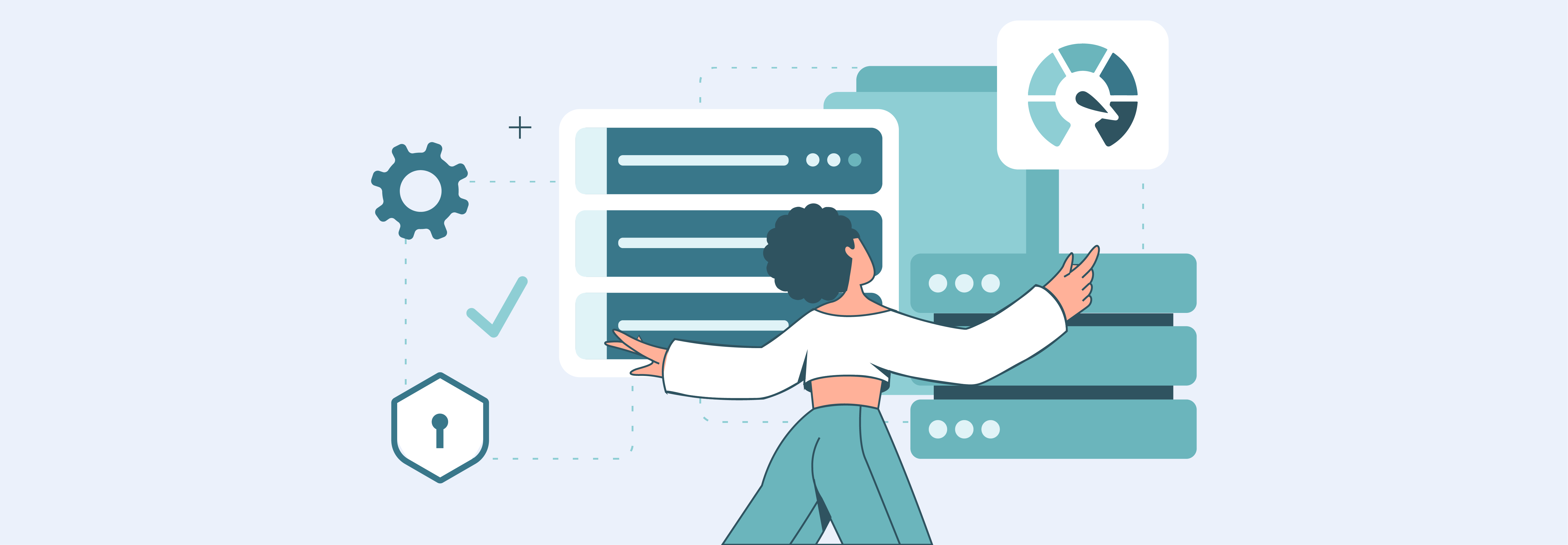
Multi-Server Hosting separates different components of your Magento store across multiple servers (e.g., one for the database and another for the web server). This approach enhances performance, reliability, and scalability by distributing the load.
Pros
1. Enhanced Performance and Scalability
One of the most significant benefits of multi-server hosting is its improved performance and scalability. By distributing the workload across several servers, Magento stores can handle higher traffic volumes and process transactions faster. It improves customer experiences and potentially leads to higher sales. Scalability is seamless, as additional resources can be added to meet growing demands without downtime.
2. Increased Reliability and Uptime
With resources spread across multiple servers, the risk of downtime is minimized. If one server fails, others can take over, ensuring that the Magento store remains operational. This redundancy is critical for maintaining high availability and ensuring that customers can always access your store.
3. Advanced Security Features
Multi-server hosting environments typically offer advanced security features. These features include firewalls, DDoS protection, SSL certificates, and regular security patches. This multi-layered approach to security helps protect sensitive customer data and financial transactions. It is a must-have for PCI compliance and building customer trust.
4. Dedicated Resources and Customization
Store owners have access to dedicated resources, which means that the performance of their Magento store is not affected by other websites. Additionally, multi-server hosting allows for greater customization of the hosting environment. It enables developers to optimize the stack for Magento's specific requirements.
5. Specialized Support
Providers of multi-server Magento hosting often offer specialized support teams familiar with the complexities of Magento. This expertise ensures that any issues can be quickly resolved, minimizing potential disruptions to your business.
Cons
1. Higher Cost
The most notable downside of multi-server hosting is the cost. The price of maintaining multiple servers, along with the advanced features and support, makes it a more expensive option. This cost may be prohibitive for small businesses or startups just entering the market.
2. Complexity in Management
Managing a multi-server hosting environment is more complex than handling a single-server setup. Store owners may need to invest in server monitoring tools or hire specialized staff. It is required to ensure smooth operation, adding to the overall cost and operational burden.
3. Technical Expertise Required
The customization and optimization possibilities of Multi-Server Hosting require a certain level of technical expertise. Magento store owners will need this expertise or hire developers to manage and optimize multiple servers effectively.
4. Potential for Over-Provisioning
Given the scalability of multi-server hosting, there's a risk of over-provisioning resources, leading to unnecessary costs. Store owners must plan their hosting needs carefully and regularly review their usage to avoid paying for unneeded capacity.
Ideal Use-Cases
-
High-traffic sites or those experiencing rapid growth.
-
Businesses that require high availability and uptime.
Important Features and Considerations for Multi-Server Magento Hosting
Multi-server Magento hosting caters to larger e-commerce stores with higher traffic volumes and more complex needs. This hosting type offers various configurations, allowing businesses to select an architecture that best fits their requirements.
Key considerations include easily scaling resources up or down based on demand and ensuring your store can handle peak traffic periods without a hitch. Additionally, a seamless synchronization between servers maintains data integrity.
1. Scalability Options
-
Flexible Infrastructure: Multi-server hosting should allow for easy scaling of resources to handle traffic spikes and growth. It means adding more servers or upgrading existing ones without significant downtime.
-
Load Balancing: Effective load balancing across servers ensures no single server becomes a bottleneck. It distributes traffic evenly to improve site performance and user experience.
-
Cloud Plans: Many web hosting providers offer cloud-based multi-server options, typically providing better scalability and flexibility. These plans should allow for automatic scaling based on traffic demands.
2. Synchronization and Replication Mechanisms
-
Database Replication: For e-commerce stores, you should ensure your database is consistently synchronized across all servers. Look for hosting solutions that offer reliable database replication services to minimize the risk of data inconsistency.
-
Content Delivery Networks (CDNs): Utilizing a CDN can significantly improve site speed for users worldwide by caching content on multiple servers globally. It is particularly beneficial for Magento stores with an international customer base.
-
Session Management: In a multi-server setup, managing user sessions can be challenging. Opt for hosting that provides a robust session management system to ensure a seamless shopping experience for your customers.
3. Disaster Recovery Planning
-
Automated Backups: Ensure the hosting plan includes comprehensive, automatic backup solutions that cover all servers. It ensures quick recovery in case of data loss.
-
High Availability Systems: Look for architectures designed for high availability, including failover systems. These systems automatically switch to a backup server in case of a failure, ensuring minimal downtime.
-
Disaster Recovery Protocols: A clear and tested disaster recovery plan is essential. It should include data restoration times, emergency contact numbers, and steps to be taken in various disaster scenarios.
4. Additional Considerations
-
Expert Support: Managing a multi-server Magento hosting environment requires specific skills. Ensure the hosting company offers access to experts familiar with Magento and multi-server setups.
-
Security Measures: Advanced security protocols, including firewalls, malware scans, and intrusion detection systems, are needed. They protect your e-commerce store from threats.
-
Pricing Structure: It's important to understand the pricing structure. You should know the potential costs for scaling up resources or adding additional services.
Auto-Scaling Hosting for Magento
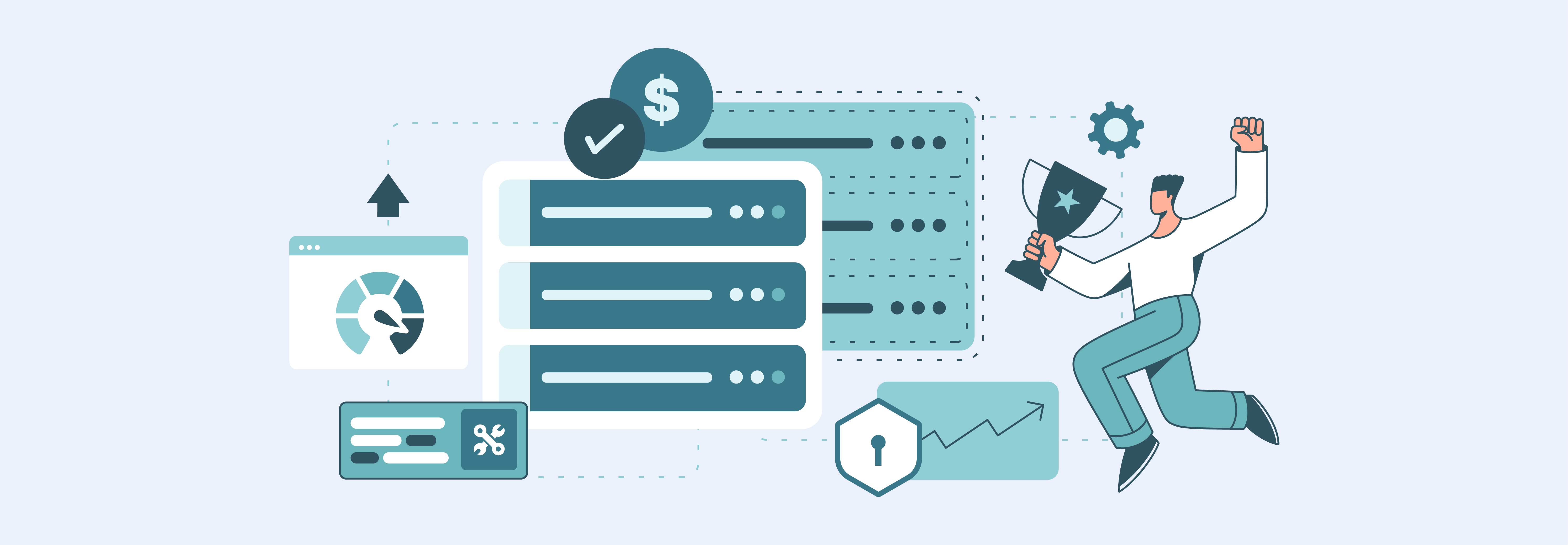
Auto-Scaling Hosting dynamically adjusts resources based on your site's traffic, scaling up during peak times and down during lulls. This flexibility provides a way for your Magento store to handle traffic spikes without manual intervention. These plans are often offered as part of cloud hosting packages.
Pros
1. Scalability to Match Demand
The primary advantage of auto-scaling hosting plans is their ability to scale resources up or down based on your store's current needs. It means your Magento 2 site can handle sudden spikes in traffic or sales without any performance degradation.
2. Cost Efficiency
With auto-scaling, you only pay for the resources you use. During periods of low traffic, your hosting costs are reduced. It makes this a cost-effective solution compared to traditional fixed-resource plans. It can lead to significant savings, especially for e-commerce stores with variable traffic.
3. Improved Site Performance and Uptime
Auto-scaling ensures that your Magento store has access to the resources it needs to maintain fast loading times, even during peak traffic periods. It improves site performance, customer satisfaction, and potentially higher conversion rates. Additionally, the distributed nature of cloud servers enhances site uptime, reducing the likelihood of downtime.
4. Enhanced Security Measures
Many auto-scaling Magento hosting plans include advanced security features like firewalls, SSL certificates, and DDoS protection. Hosting companies often implement the latest security protocols and updates to protect your site from threats.
5. Technical Support and Infrastructure
Leading hosting providers offering auto-scaling plans have experienced support teams and state-of-the-art data centers. It ensures high availability and reliability and access to expert assistance when needed. For example, you should have help configuring your hosting environment or addressing technical issues at all times.
Cons
1. Complexity in Setup and Management
Auto-scaling environments can be more complex to set up and manage than traditional hosting plans. It might require more technical expertise or hiring specialists to optimize your hosting environment for Magento.
2. Potential for Unexpected Costs
Auto-scaling can lead to unexpected expenses if traffic surges are more significant or frequent than anticipated. It's essential to monitor your usage closely and understand the pricing structure to avoid surprises.
3. Dependence on the Hosting Provider
Your e-commerce store's performance and scalability are closely tied to the capabilities and reliability of your hosting provider. Choosing an autoscaling hosting provider with a robust infrastructure, excellent uptime records, and responsive support is crucial.
4. Limited Control Over Server Environment
With auto-scaling cloud hosting plans, you may have less control over the server environment than traditional VPS or dedicated hosting. It could impact your ability to implement custom configurations or optimizations specific to Magento.
5. Integration and Compatibility Issues
You might encounter challenges integrating certain applications, extensions, or customizations. Verifying compatibility and support for your Magento version and any third-party tools you plan to use is essential.
Ideal Use-Cases
-
E-commerce sites with highly variable traffic patterns.
-
Businesses looking to optimize costs while accommodating growth.
Critical Features for Magento Auto-Scaling Environments
The key to a successful auto-scaling setup is its ability to seamlessly scale resources up or down, a feature that benefits stores of all types and sizes.
Price considerations are important, as the cost of auto-scaling services can vary based on the number of resources used. It's advisable to compare prices and account for potential discounts hosting providers offer, as this can significantly affect overall expenses.
1. Dynamic Resource Allocation
-
Automatic Scaling: The system should automatically adjust computing resources based on current demand. It should scale up during traffic spikes and down during low-traffic periods. It ensures your Magento store always has the right resources without manual intervention.
-
Cost-Efficiency: Dynamic allocation helps optimize hosting expenses, as you only pay for the resources you use. It can significantly reduce costs compared to a fixed-resource hosting plan.
-
Performance Management: Properly configured, dynamic resource allocation ensures your e-commerce store maintains high-performance levels. It enhances user experience and potentially increases sales conversions.
2. Monitoring and Alerting Systems
-
Real-Time Monitoring: A comprehensive monitoring system should track the health and performance of your Magento store. It should monitor metrics such as CPU usage, memory usage, and response times to determine when to scale resources.
-
Alerting Mechanisms: The system should include alerting features to notify you of critical performance issues or automatic scaling actions. It allows you to stay informed and make necessary adjustments or preparations.
-
Analytics and Reporting: Insights into historical performance data can help forecast future resource needs. It can identify trends or potential issues before they become critical.
3. Integration with Cloud Services
-
Cloud Flexibility: Integration with cloud services like AWS, Google Cloud, or Azure offers flexibility and a wide range of services for Magento stores. It can provide database management, CDN, and advanced analytics.
-
Seamless Migration: Look for services that offer seamless site migration support to minimize downtime and ensure a smooth transition.
-
Enhanced Security: Cloud services often have built-in security features like DDoS protection and SSL certificates. It provides an additional layer of security for your Magento store.
4. Additional Considerations
-
Ease of Use: Managing your auto-scaling environment shouldn’t require advanced technical knowledge. Look for solutions that offer intuitive interfaces and straightforward management tools.
-
Support for Developers and Merchants: Access to expert support is crucial, especially when dealing with complex environments. Ensure the hosting provider offers robust support for troubleshooting and advice.
-
Compatibility and Integration: Your auto-scaling solution should be compatible with other tools and services you use. It should work with payment gateways, shipping services, and marketing tools.
Choosing the Right Magento Hosting Plan
Selecting the right hosting plan for your Magento store involves assessing your current needs, future growth plans, traffic patterns, budget, and technical capabilities. When choosing between single-server, multi-server, and auto-scaling hosting plans for your Magento store, consider the following factors:
I. Budget
1. Initial Costs
Consider the upfront expenses associated with setting up your Magento hosting. It includes any setup fees or investments in additional hardware or software.
2. Ongoing Costs
Factor in recurring expenses, such as monthly or annual hosting fees, maintenance costs, and potential charges for exceeding bandwidth or storage limits.
3. Cost-Benefit Analysis
Evaluate each hosting plan's cost implications against its benefits. Look for improved site performance, enhanced security features, or superior customer support.
II. Technical Expertise
1. Self-Management vs. Managed Hosting
Determine whether your team can manage server operations, security patches, and updates. If not, a managed hosting solution would be more appropriate.
2. Access to Support
Consider the level of support you will need. Evaluate the hosting provider's support team regarding availability, responsiveness, and technical expertise.
III. Traffic and Sales Volume
1. Current Traffic Levels
Analyze your website's current traffic patterns, including peak traffic periods and any seasonal fluctuations.
2. Anticipated Growth
Estimate future traffic and sales volume increases. It ensures your chosen hosting plan can accommodate this growth without affecting site performance.
3. Scalability
Look for hosting options that offer easy scalability, allowing you to upgrade your resources as your store grows.
IV. Security and Compliance Needs
1. Data Protection
Ensure the hosting plan includes robust security measures such as firewalls, SSL certificates, and regular backups.
2. Compliance Requirements
If your store handles sensitive information, verify that the hosting solution complies with relevant regulations (e.g., GDPR, PCI DSS for payment processing).
IV. Growth Plans
1. Long-term Scalability
Choose a hosting plan that meets your current needs and can support your business as it expands.
2. Flexibility
Consider the ease of migrating to a more powerful plan or a different hosting provider if your needs change.
3. Partnership Potential
Evaluate the hosting provider's reputation, customer reviews, and willingness to partner in your store's growth.
FAQs
1. What are the key differences between Magento's single-server, multi-server, and auto-scaling hosting plans?
Single server hosting allocates your Magento cart to one server, making it suitable for small to medium-sized stores. Multi-server hosting distributes your store's workload across multiple servers. They enhance performance and scalability for larger e-commerce platforms.
Auto-scaling plans, often hosted on platforms like AWS, Google Cloud, automatically adjust resources based on demand. They offer flexibility for stores with fluctuating traffic.
2. How does the hosting plan choice affect my Magento store's performance and scalability?
The choice significantly impacts your store's ability to handle traffic and process orders. Single-server plans might struggle under heavy loads, while multi-server and auto-scaling plans provide more robust infrastructure. With SSD storage and optimized server location, multi-server plans ensure smoother checkout experiences.
3. Can I switch hosting plans if my e-commerce store outgrows its current hosting arrangement?
Most hosts offer the flexibility to upgrade or change your hosting plan based on your store's needs. Look for hosts that offer a seamless transition with minimal downtime, support from a knowledgeable team, and a money-back guarantee to ensure your transition is as risk-free as possible.
4. What should I consider when choosing a hosting plan for a Magento store targeting a global audience?
Consider server location to minimize latency for your target audience. CDN availability ensures faster content delivery worldwide, and IP address allocation enhances site security. Additionally, ensure your hosting plan can handle multiple currencies and languages. Check if the support team can assist with queries or issues across different time zones.
5. What additional features should I look for in a Magento hosting plan to enhance my store's security and customer experience?
Look for hosting plans that include SSL certificates, advanced firewall configurations, DDoS protection, and regular security patches. Features like one-click installer for CMS and platforms, root access for custom server management, and dedicated IP addresses are useful. Consider plans that offer SSD storage for faster data access, storage space starting from at least 10GB, and a dedicated phone support line.
Summary
The best Magento hosting plan for your e-commerce store depends on your specific needs, technical capabilities, and growth aspirations. You can choose anything between the simplicity and affordability of single-server hosting and the scalability and performance of multi-server solutions. Or, you can opt for the dynamic resource allocation of auto-scaling plans. Consider only those Magento hosting plans that offer robust support, an uptime guarantee, and features that align with your e-commerce goals.



